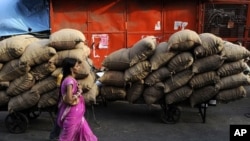India expects a record harvest of rice and wheat, but officials have warned that huge food stocks could be wasted due to lack of adequate storage facilities. The government has been criticized for holding on to huge surpluses while millions of people go hungry.
By the end of June, farmers across India will have harvested more than 250 million tons of wheat and rice. The bumper crops should be cause for cheer. Instead the country is confronting a challenge of plenty.
The Food Corporation of India - which stores the grain - has told the Food Ministry that it has neither the warehouse capacity nor the manpower to manage the increase.
Every year, the government purchases millions of tons of grain from farmers to ensure they get a good price, for use in food subsidy programs, and to maintain an emergency stockpile.
Officials say this year’s record production could leave the government with 75 million tons of grain on its hands. With facilities only to store 63 million tons in state-run warehouses, millions of tons could be left out in the open, vulnerable to rain and attacks by rodents, or stored in makeshift spaces, covered by waterproof sheets.
Food Minister K.V. Thomas says the government is taking steps to reduce the huge stockpiles and make space for the new harvest. It has allowed traders to export surpluses and will lease warehouses for one year to expand capacity. But Thomas admits that dealing with the surplus is a big challenge.
“We should understand we are handling 70-71 million tons. It is just like a war-like situation. You have to procure," explained Thomas. "You have to store. You have to transport. And India is such a huge country. This is not an easy job we are doing. ”
Minister Thomas says they are also investing in modern food storage infrastructure. But he says that while food grain production has soared in the last two years, new warehouses are coming up more slowly because “they cannot be built in a day.”
Activists say the problem that needs fixing is not just storage - but getting the food to some 200 million people who are malnourished. U.N. agencies say India has the largest number of hungry people in the world.
Biraj Patnaik, a commissioner to the Supreme Court who advises policy makers on issues relating to food security, says the problem has arisen because the government does not want to scale up the distribution of food grains to the poor.
He explains that just three states: Punjab, Madhya Pradesh and Haryana - grow most of India’s grain, and the food has to be transported to far flung areas.
“What the government ideally ought to do is distribute it to the people who deserve the food grain to the poorest of the poor," Patnaik said. "In the short run, you need to increase the food subsidy in order to make this distribution happen, and the government is extremely reluctant to increase the subsidy. In my opinion it is being penny wise and pound foolish.”
The government is hoping to address such concerns. It wants to pass an ambitious law to give cheap wheat and rice to two-thirds of the country’s 1.2 billion people. The Food Security Bill has already been introduced in parliament and will be debated by lawmakers in the coming weeks.
Food Minister Thomas says if the law is passed, much of the grain will be utilized.
“I am pretty confident because of the new Food Security Bill coming, it needs about 62-63 million tons of food grain, and the midday meal scheme, and the scheme for the pregnant women, so all these schemes once we implement, we need more food grains…so with these actions I think we will be able to contain a situation where there is a lot of surplus food grain in the country,” Thomas said.
The waste of food grain has raised concerns in a country where more than 40 percent of children are underweight. Last year the Supreme Court ordered the government to supply more food grains to hungry people.
India grows enough food to meet the needs of its 1.2 billion people. It is estimated that about seven percent of food grains are wasted due to lack of storage space and inefficient transportation.
News
In India, Inadequate Storage Could Mean Wasted Food




